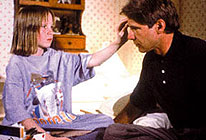|
|
|
|
Regarding
Henry
|
 |
|
If you've seen the trailer for Regarding Henry with Harrison Ford, you know most of the plot already. A cold-hearted yuppie lawyer fleeces honest people in court, and barks at his wife, child and maid in their sterile mansion of a home. Then, one fateful night, he encounters a corner store mugger, and two well-placed bullets mean that he must start his life over again from scratch. The implications of this premise are intriguing. Henry's personality and memory have been completely wiped by the shooting, like a reformatted computer disc. This device is very handy when it comes to disavowing certain sins of the hero's past life, such as his lover at work. But it doesn't exactly allow for a coherent or plausible story. At one moment, Henry can't even remember how to make love, forcing him to seek an uncomfortable lesson in this particular art from a porno movie. But at another moment, about three seconds after Henry has struggled to read the words "are you my mother?" out of a children's book, he's poring over the old case files of his legal practice, exposing the corruptions and injustices of an inhumane system. Regarding Henry is the latest film about what it takes, and what it means, to be a New Man, although it has less to say on this topic than just about any other entry in this cycle. Like the Tom Hanks regression comedy Big (1988), it focuses on the image of the child-man. Not only does Henry, after his makeover, not have a single aggressive or malicious bone in his body; he also becomes an immaculate social innocent, naturally drawn to the servants and blacks dotting the margins of the yuppie set. And, as a companion playmate, he's even able to wipe that sulky, neglected look off his little daughter's face. One of the press quotes used to push Regarding Henry refers to it as a film of "simple pleasure". True enough, since it's hardly a film of complex pleasure. But the description is true in another way. One of the weirdest things about the film is its ceaseless elegance. Mike Nichols, after all, is not exactly an untalented or unresourceful director. Put him to work on such an undeveloped, uninspiring property, and what you get is a film so glazed over, so evenly paced, that it's almost abstract. Nichols offers us the simple pleasure of watching a grown man with a boyish smile on his dial walk in and out of doorways for about one hundred minutes. MORE Nichols: Closer, The Graduate © Adrian Martin November 1991 |
![]()